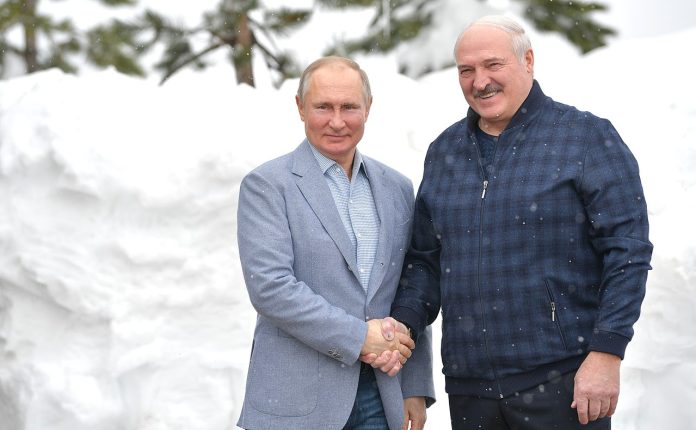In a new report, MEPs call on the Belarusian regime to release all political prisoners, while expressing great concern over the country’s subordination to Moscow.
On Tuesday, the Foreign Affairs Committee adopted a new report on EU relations with Belarus, with 49 votes in favour, 3 against with 2 abstentions. In the text, MEPs condemn in the strongest terms the unabated repression and systematic human rights violations continuously committed by the regime of dictator Aliaksandr Lukashenka against its own people. With close to 1500 political prisoners, including lawyers, trade unionists, journalists and human rights defenders, behind bars in Belarus, the report also calls for the release of all those wrongly jailed, while noting that over 300 000 Belarusians have fled the country due to the crackdown by the authorities.
Fears over Russia’s subordination of Belarus
Strongly condemning the Belarusian regime’s role as an accomplice in Russia’s war of aggression against Ukraine, MEPs note with great concern the rampant political, economic, military and cultural subordination of Belarus to Moscow, rendering the country a de-facto satellite state that also hosts tactical nuclear weapons under Russian command.
They call on the EU not to recognise any agreements made by the Lukashenka regime and Russia that cede the country’s sovereignty against the will of the Belarusian people. The EU must also develop a common strategy for preserving Belarus’ independence and for Belarus’ transition to democracy, with the participation of international institutions, the OSCE, the Council of Europe and the G7.
The report also concludes that the recent arrival of Wagner Group fighters in Belarus creates new potential security risks for Ukraine as well as for Belarus’ EU neighbours and the EU as a whole, with MEPs reiterating their demand to put the paramilitary force on the EU’s terrorist list. They call for tougher EU sanctions against Minsk and regret that some EU countries are lobbying for sanctions against Belarusian potash producers to be lifted, including Belaruskali, which serves as one of the regime’s main sources of income.
Call for international arrest warrant for Aliaksandr Lukashenka
Belarus is responsible for damage caused to and crimes committed in Ukraine, MEPs point out, including through the regime’s role in the illegal transfers of children. The report therefore calls on the EU institutions and member states to take all necessary steps at international level to enable the criminal prosecution of those Belarusian political and military leaders responsible for crimes against humanity and genocide. With the International Criminal Court (ICC) already having issued arrest warrants for Russian President Vladimir Putin and Russian Children’s Rights Commissioner Maria Lvova-Belova, MEPs call on the ICC to consider a similar arrest warrant for Aliaksandr Lukashenka. The Council should also expand the list of Belarusian and Russian individuals sanctioned by the EU, including those involved in forced deportations of Ukrainian children, MEPs say.
Crackdown against minorities
Amidst efforts by the Belarusian regime to supress the national Belarusian language and crackdown on minorities, MEPs express their solidarity with those Belarusians seeking to protect and nurture their national identity, and particularly their language. They also urge the Belarusian regime to end its discrimination and violence against all minorities, and condemn the authorities for targeting the country’s ethnic Lithuanian and Polish communities.
“The Lukashenka regime has engaged in unprecedented internal repression against the Belarusian people and has become an accomplice in Russia’s war of aggression against Ukraine. The EU’s strategy towards Belarus must therefore bear in mind the crimes of the Lukashenka regime, seek accountability, and, in cooperation with the Belarusian democratic forces, find the necessary solutions and take decisive action to fulfil the European aspirations of the Belarusian people for freedom and independence”, said rapporteur Petras Auštrevičius (Renew Europe, Lithuania), after the vote.
More support to Belarusian democratic forces needed
The report highlights that Belarus shares strong ties with European culture and identity, with MEPs acknowledging and supporting the declarations about the European aspirations of Belarusians made by the representatives of the country’s democratic forces, including Sviatlana Tsikhanouskaya. They also call on the EU and its member states to develop a more ambitious strategy for and give more economic support to the Belarusian democratic forces, including opposition political parties, civil society activists, human rights defenders, artists, independent trade unions and free media both in and outside Belarus.

[High Representative/Vice-President Josep Borrell launched on June 29 a new Consultative Group between the European Union and Belarusian democratic forces and civil society, in the presence of Sviatlana Tsikhanouskaya and other prominent figures of the Belarusian opposition and civil society. © EUROPEAN UNION, 2023]
The report also pushes for the EU and the international community to make greater efforts to formalise the cooperation with the Belarusian democratic forces, who, according to MEPs, should be treated as the legitimate democratic representatives of the people of Belarus.
Prohibit Belarusian athletes from competing, concerns over upcoming elections
MEPs finally urge the International Olympic Committee and other international sports federations not to allow athletes from Belarus and the Russian Federation to compete at the Paris 2024 Olympic Games or any other international sports event. They also express concern about the transparency, freedom and fairness of the upcoming 2024 parliamentary and local elections in Belarus, in particular in the light of new restrictions making it impossible for any opposition parties critical of the regime to run.
The report will now be submitted to the European Parliament as a whole for its approval. The plenary vote is scheduled for September.

